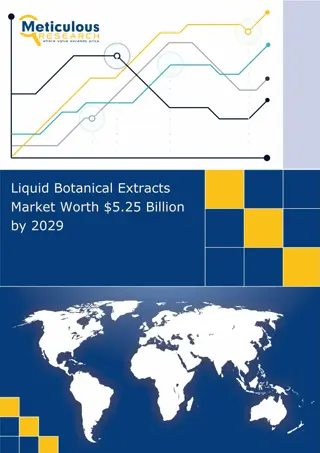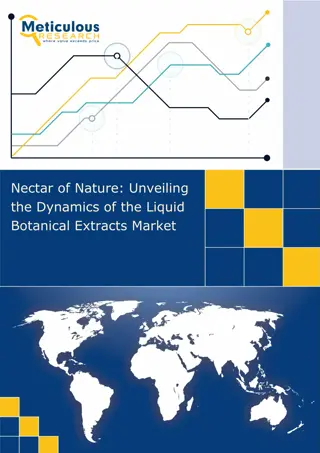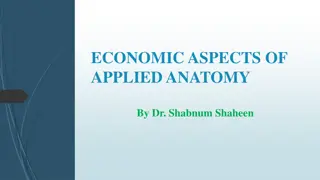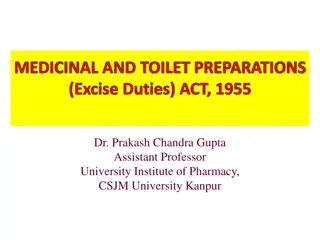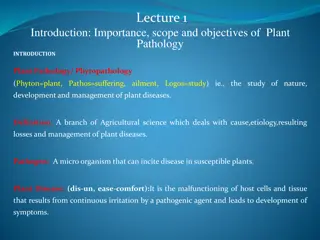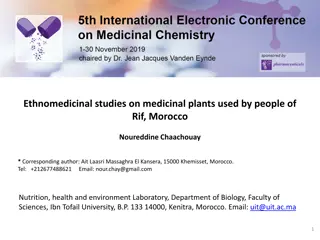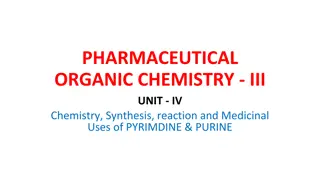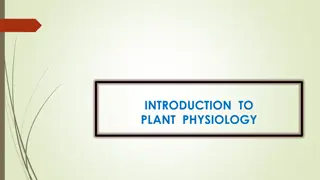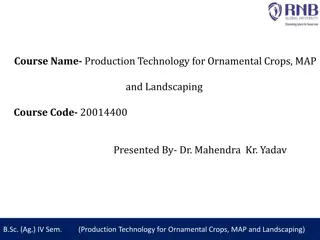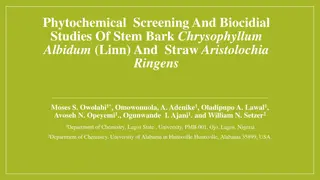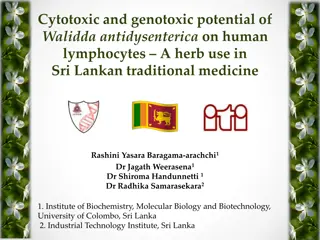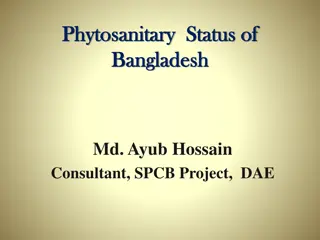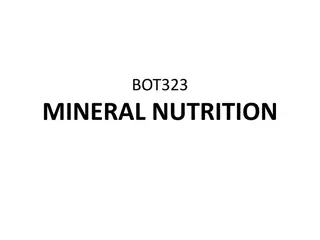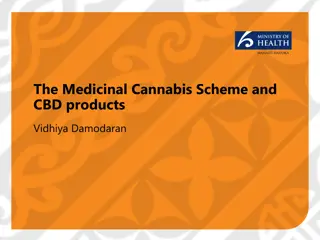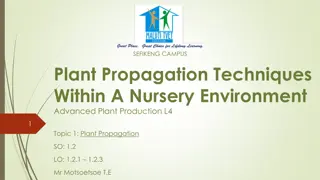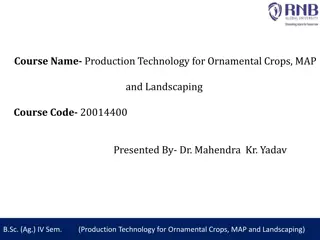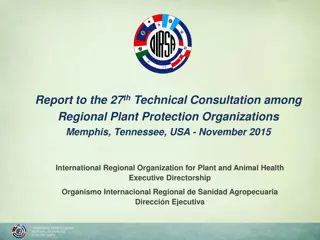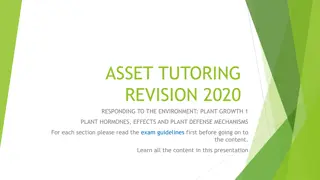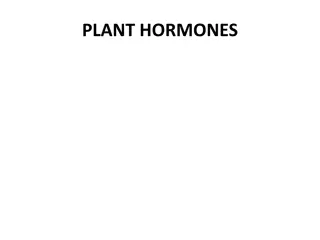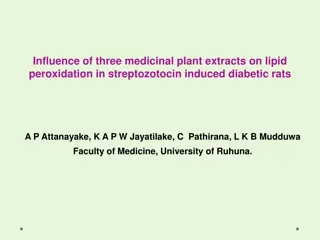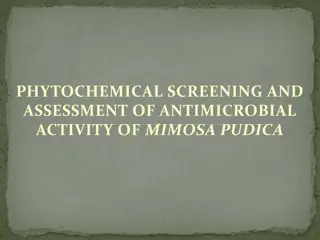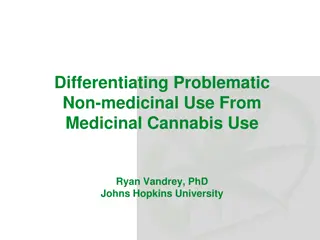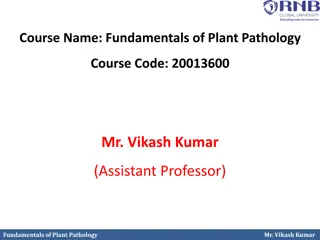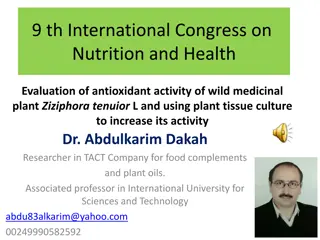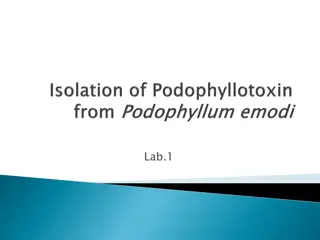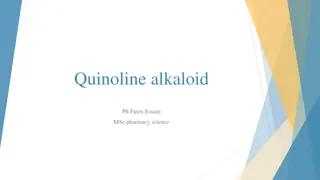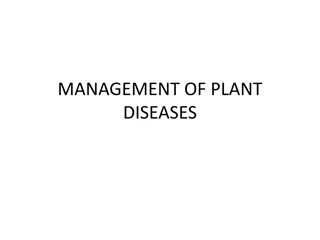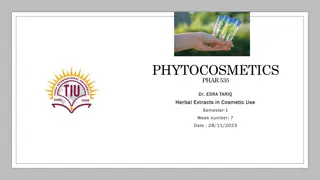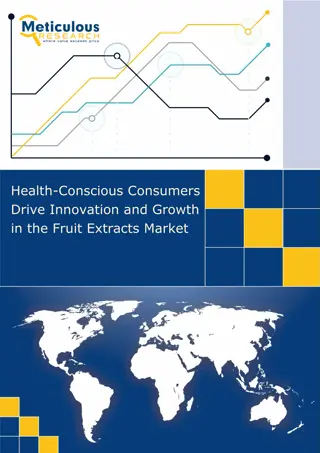Liquid Botanical Extracts Market Worth $5.25 Billion by 2029
The rising demand for liquid botanical extracts in cosmetic applications, growing demand for ready-to-use botanical extracts, increasing health and wellness trends with consumption of natural health products, and increasing awareness regarding the benefits of herbal products over synthetic products
3 views • 4 slides
Liquid Botanical Extracts Market Share Worth $5.25 Billion by 2029
Comparatively, natural liquid botanical extracts provide a superior alternative to synthetic ingredients to infuse pleasant, rich, and earthy colors into a product. Liquid botanical extracts contain specific bioactive compounds that offer unique skin-enhancing benefits for streamlined cosmetics. For
0 views • 4 slides
Milk Thistle Extracts Market Research Report 2019-2029|Relevant Trend, Overview
The Milk Thistle Extracts Market,\u00a0research, a thorough examination of the state of the industry, market size, demand trends, development patterns, and projections from 2019\u00a0to 2029, was just published by Adroit Market Research.
0 views • 5 slides
Dab press machine
A notebook dab press machine is a compact, portable device that extracts oils from botanical materials. Typically featuring dual heated plates, it applies precise pressure and temperature to release the essential oils and resins. Perfect for small-scale personal use, offering a user-friendly interfa
3 views • 2 slides
TOP 10 COMPANIES IN LIQUID BOTANICAL EXTRACTS MARKET
Powdered botanical extracts dissolve appropriately, while liquid botanical extracts are ready-to-use. Thus, they provide convenience and ease of use for cosmetics and pharmaceutical formulators. Moreover, the inclusion of single or multiple liquid botanical extracts in a formulation makes it possibl
0 views • 4 slides
Sources of Drugs and Their Origins
Drugs can be sourced from six major categories: plants, animals, minerals/earth, microbiological sources, semi-synthetic sources, synthetic sources, and recombinant DNA technology. Plant sources, being the oldest, provide various medicinal properties through leaves, flowers, fruits, seeds, roots, ba
0 views • 11 slides
Economic Aspects of Applied Plant Anatomy in Practical Use
Applied Plant Anatomy involves the practical application of anatomical knowledge in various fields such as identification, classification, taxonomic applications, medicinal plants, food safety, wood analysis, forensic investigations, and more. By understanding plant anatomy, professionals can utiliz
0 views • 26 slides
Understanding Plant Tissue Culture Media and Their Importance in In Vitro Growth
Plant tissue culture media play a crucial role in the in vitro growth and morphogenesis of plant tissues. The composition of culture media depends on the specific plant species and the type of material used for culture. Various types of media, such as White's medium, MS medium, B5 medium, N6 medium,
0 views • 6 slides
Understanding Shakespeare's Extracts for WJEC A-Level English Literature Unit
Explore strategies for analyzing Shakespearean extracts effectively in the WJEC A-Level English Literature Unit, focusing on key points, detailed support, verbatim recall of critical views, and interpreting context. Learn how to prepare and respond to the Shakespeare extract questions, emphasizing c
0 views • 19 slides
Exploring Shakespeare's Use of Language in Macbeth's Mini Extracts
Delve into Shakespeare's masterful use of language in mini extracts from Macbeth's Act 1 scenes, analyzing how he creates a sense of unease, excitement, and deceptive appearances through techniques like short sentences, rhythm, alliteration, and metaphors. Dive into the world of Macbeth and uncover
0 views • 46 slides
Understanding the Medicinal and Toilet Preparations (Excise Duties) Act, 1955
The Medicinal and Toilet Preparations (Excise Duties) Act, 1955 was introduced to standardize excise duties on alcohol-containing medicinal and toilet preparations across India. It aims to regulate the collection of levies, ensure uniformity in duty rates, and address irregularities from previous ac
0 views • 35 slides
Understanding Plant Pathology: Importance, Scope, and Objectives
Plant pathology, also known as phytopathology, is the study of plant diseases and their management. It covers the causes, symptoms, and impact of pathogenic organisms on plants. The field aims to understand the interactions between plants and pathogens, develop control methods, and reduce losses in
0 views • 6 slides
Ethnomedicinal Studies on Medicinal Plants in Rif, Morocco
This study conducted in the Rif region of Morocco aimed to identify medicinal plants used by local people to treat digestive system disorders. The research documented 87 plant species from 43 families, highlighting the community's reliance on traditional ethnomedicinal knowledge. Results indicated T
2 views • 14 slides
Chemistry, Synthesis, Reactions, and Medicinal Uses of Pyrimidine & Purine
Explore the fascinating world of pharmaceutical organic chemistry in Unit IV, focusing on the chemistry, synthesis, reactions, and medicinal applications of Pyrimidine and Purine compounds. Dive deep into the structures, properties, and pharmacological significance of these essential molecules throu
1 views • 15 slides
Introduction to Plant Physiology: Exploring the Functioning of Plants
Plant physiology is a crucial subdiscipline of botany that delves into the processes and functions operating within plants. This field closely examines areas like plant morphology, ecology, cell biology, and genetics, shedding light on vital processes such as photosynthesis, respiration, and more. T
1 views • 7 slides
Understanding Plant Tissue Culture: Techniques and Applications
Plant tissue culture involves maintaining and growing plant cells, tissues, or organs in artificial mediums under controlled conditions. It allows the regeneration of whole plants from small plant parts or cells. Hormones like auxins, cytokinins, and gibberellins are used in the process. Proper envi
3 views • 5 slides
Production Technology for Ornamental Crops, MAP, and Landscaping Overview
This course covers the production technology for ornamental crops, medicinal and aromatic plants, and landscaping principles. It includes identifying different types of plants, cultivation practices, medicinal uses, and processing techniques. Specific focus is given to the production technology of a
0 views • 10 slides
Phytochemical Screening and Biocidal Studies of Chrysophyllum Albidum and Aristolochia Ringens
This study focuses on the phytochemical screening and biocidal properties of extracts from Chrysophyllum albidum (White Star Apple) and Aristolochia ringens. The research explores the medicinal potential of these plants, highlighting their traditional uses and scientific findings. Methods for plant
0 views • 15 slides
Cytotoxic and Genotoxic Potential of Walidda Antidysenterica on Human Lymphocytes: A Study in Sri Lankan Traditional Medicine
Investigating the cytotoxic and genotoxic effects of Walidda antidysenterica extracts on human lymphocytes in Sri Lankan traditional medicine. The plant is widely used for its diverse medicinal properties, including treating various diseases and promoting overall health. The study aims to understand
0 views • 27 slides
Plant Tissue Culture Methods for Growth and Reproduction Study
Plant tissue culture methods such as root tip culture, shoot-tip culture, leaf culture, flower culture, and anther and pollen culture allow for the study of growth, reproduction, and genetic variations in plants. These techniques involve culturing various plant parts under sterile conditions to inve
1 views • 20 slides
Understanding Plant Quarantine and Phytosanitary Measures
Plant quarantine involves efforts to prevent the entry, establishment, or spread of foreign pests through legal restrictions on plant and plant product movement. It is crucial for safeguarding plant health, food production, and ecosystems. Phytosanitary measures aim to ensure the health of plants by
0 views • 33 slides
Understanding Mineral Nutrition in Plants
Mineral nutrition in plants involves the acquisition of essential elements in the form of inorganic ions from soil, followed by their absorption and utilization in various plant processes. Around 60 different elements have been reported in plants, with 30 being essential for plant growth. These esse
0 views • 39 slides
Overview of Medicinal Cannabis Scheme and CBD Products in New Zealand
The Medicinal Cannabis Scheme in New Zealand aims to improve access to quality medicinal cannabis products for patients by setting up a licensing regime for manufacture and supply. It establishes minimum quality standards to ensure consistency and quality of prescribed products. Access to medicinal
0 views • 10 slides
Plant Propagation Techniques in Nursery Environment
Learn about plant propagation techniques within a nursery environment, including nursery operations, potting seedlings, plant protection, weed control, packing of nursery plants, and crafting tissues for plant growth. Explore the essential tasks involved in nurturing seedlings and trees before they
0 views • 17 slides
Production Technology of Periwinkle - Medicinal Plant Cultivation Guide
Learn about the production technology of periwinkle, a perennial ornamental herb with medicinal properties. Understand its botanical details, uses in treating diseases, cultivation requirements such as soil and climate preferences, and its significance in pharmaceuticals. Discover the various alkalo
0 views • 10 slides
Plant Health Initiatives at the 27th Technical Consultation Among Regional Plant Protection Organizations - Memphis, Tennessee
The 27th Technical Consultation in Memphis, Tennessee focused on plant health initiatives by the International Regional Organization for Plant and Animal Health. OIRSA emphasized four key technical areas: plant health, animal health, agricultural quarantine, and food safety. Projects included addres
0 views • 13 slides
English Language Paper 1 Practice Questions and Timings Guide
Enhance your English Language Paper 1 skills with practice questions under timed conditions. Learn how to effectively allocate your time for each question and analyze language use in the given extracts. Master the art of reading questions and extracts first for a focused approach to answering. Get r
0 views • 22 slides
Plant Growth Hormones and Defense Mechanisms: Understanding Plant Responses to the Environment
Plant growth hormones and defense mechanisms play crucial roles in how plants respond to environmental stimuli such as water, sunlight, gravity, and more. From auxins promoting cell growth to gibberellins stimulating flowering, this presentation educates on the intricacies of plant hormones and thei
0 views • 13 slides
Comprehensive Guide for Writing Hamlet Extracts and Essays at A-Level
Your essential companion for excelling in Hamlet extract and essay writing at A-Level. This comprehensive guide covers AO1, AO2, AO3, and AO5 requirements, providing strategies for analyzing extracts, learning quotes and context, tackling extract and essay questions effectively, and incorporating cr
0 views • 11 slides
Understanding Plant Hormones and Their Role in Growth and Development
Plant hormones are vital compounds that regulate various processes in plant growth and development. They are mostly organic and can be gases. These hormones are produced in one part of the plant and transported to other parts where they induce physiological effects. The main phytohormones include Au
0 views • 125 slides
Influence of Medicinal Plant Extracts on Lipid Peroxidation in Diabetic Rats
Traditional medicinal plant knowledge plays a crucial role in diabetes treatment. Free radicals and oxidative stress are key factors in diabetic complications. This study investigates the effects of three plant extracts on lipid peroxidation in diabetic rats, highlighting the potential benefits of n
0 views • 20 slides
Phytochemical Screening and Antimicrobial Assessment of Mimosa pudica
This study explores the antimicrobial potential of Mimosa pudica extracts through phytochemical screening. Researchers investigated the leaves' antimicrobial characteristics and screened for phytochemical compositions to understand their effects on various microorganisms. The methodology involved sa
0 views • 18 slides
Understanding Problematic vs. Medicinal Cannabis Use
Cannabis presents a unique case of transitioning from illicit to legal status, highlighting the importance of distinguishing between problematic non-medicinal and medicinal use. Despite availability and changing laws, there's a risk of transitioning from medicinal to problematic use, necessitating c
0 views • 18 slides
Exploring the Fundamentals of Plant Pathology: Understanding Viruses in Plant Diseases
Delve into the world of plant pathology with Mr. Vikash Kumar, as you learn about the nature, structure, and transmission of viruses affecting plants. Explore the important characteristics of plant viruses, their unique properties, and how they interact within plant cells. Gain insights into viral d
0 views • 14 slides
Understanding the Role of Antioxidants in Health: Insights from Dr. Abdulkarim Dakah's Research
Dr. Abdulkarim Dakah's research focuses on evaluating the antioxidant activity of the wild medicinal plant Ziziphora tenuior and using plant tissue culture to enhance its effectiveness. He discusses Reactive Oxygen Species (ROS), diseases caused by ROS, methods to reduce ROS in the body, and the imp
0 views • 18 slides
Exploring Podophyllum Emodi: Medicinal Properties and Extraction Process
Podophyllum Emodi, also known as Indian Podophyllum, is a plant native to the north Himalayan region. It contains podophyllotoxin, a lignan compound with various medical applications such as treating genital warts and cancer. The extraction process involves isolating podophyllotoxin from the roots a
0 views • 10 slides
Understanding Quinoline Alkaloids in Ruta graveolens for Medicinal Purposes
Ruta graveolens, commonly known as Rue, contains quinoline alkaloids and other active constituents with medicinal properties. This plant is used in the treatment of various inflammatory conditions, ulcers, arthritis, and more. However, there are cautionary notes for specific groups such as pregnant
0 views • 14 slides
Overview of Plant Quarantine and Disease Management
Plant quarantine is a crucial practice that involves regulating the movement of plants and plant products to prevent the spread of pests and diseases. Originating with the first law in France in 1860, plant quarantine now encompasses various methods such as embargoes and inspections to safeguard pla
0 views • 11 slides
Herbal Extracts in Cosmetic Use: Coconut, Green Tea, Aloe & More
Explore the benefits of herbal extracts in skin care with a focus on coconut, green tea, and aloe. Discover how ingredients like coconut oil, green tea catechins, and aloe vera gel provide nourishment, protection, and rejuvenation for the skin. Learn about their properties, uses in cosmetics, and th
0 views • 17 slides
Fruit Extracts Market
The global fruit extracts market is expected to reach $31.11 billion by 2031, spurred by innovative product development and a shift towards healthier options.\n
1 views • 5 slides

